|
|
|
Sort Order |
|
|
|
Items / Page
|
|
|
|
|
|
|
| Srl | Item |
| 1 |
ID:
170340
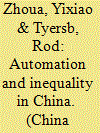

|
|
|
|
|
| Summary/Abstract |
In transitional economies, low wages imply sub-OECD yet growing labor shares of value added. China's rapid development has, however, seen a declining low-skill labor share and rising inequality. Here, a stylized model with three households and separable TFP and factor bias suggests a third of the decline in the low-skill share since 1994 is due to structural change and the rest mainly to skill-biased technical change. Expected future twists away from low-skill labor toward capital yield further inequality, moderated if strong TFP growth and population stability continue. But if the bias accompanies TFP shortfalls, worker displacement and rising inequality are in prospect.
|
|
|
|
|
|
|
|
|
|
|
|
|
|
|
|
| 2 |
ID:
090111


|
|
|
|
|
| Publication |
2009.
|
| Summary/Abstract |
In the published literature, the differences in environmental performance across countries are typically explained using the Environmental Kuznets Curve. The Environmental Kuznets Curve states that pollution initially increases with economic growth. Once GDP per capita reaches a certain level, the relationship reverses. In the present paper, we provide an alternative hypothesis, where budget structure plays an important role in explaining the variations in pollution across the world: the lower the business-related taxes as a share of total tax revenue, the higher the property tax in total tax revenue and the higher the ratio of public health expenditure in total expenditure, then the stronger the incentive of pollution control and the lower the pollution level. Our empirical findings reveal that the budget structure does have an important impact on pollution control. The policy implication of this research is that effective control of environmental pollution requires changes in tax structure and expenditure assignment. This research has important policy implications for China's tax system reform and pollution control efforts.
|
|
|
|
|
|
|
|
|
|
|
|
|
|
|
|
| 3 |
ID:
103758
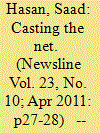

|
|
|
| 4 |
ID:
121765


|
|
|
|
|
| Publication |
2013.
|
| Summary/Abstract |
This article explores and critically examines the connections between tax and development on the one hand and tax and corporate social responsibility (csr) on the other. It does so because, while there is increasing recognition of the importance of taxation to efforts to resource the state and to finance ways of tackling poverty, there is a surprising lack of attention to tax avoidance and evasion as a csr issue for transnational corporations operating in the South, even among those companies that pride themselves on being csr leaders. We review evidence of these trends, provide an empirical analysis of how leading firms deal with tax in their corporate reporting and make the case for including taxation as a new frontier in progressive csr.
|
|
|
|
|
|
|
|
|
|
|
|
|
|
|
|
| 5 |
ID:
091804
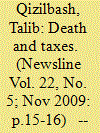

|
|
|
|
|
| Publication |
2009.
|
| Summary/Abstract |
US Senator John Kerry and I share a problem: difficulty in giving money to the Government of Pakistan (GoP). Late last month, after another frustrating round of listening to Pakistani officials complain about the Kerry-Lugar Bill, the lanky US senator said that never before had he had so much difficulty in trying to give away $7.5 billion.
|
|
|
|
|
|
|
|
|
|
|
|
|
|
|
|
| 6 |
ID:
148683


|
|
|
|
|
| Summary/Abstract |
Aggressive tax planning by multinational enterprises (MNEs) costs EU member states between €50-70 billion and €150-190 billion per annum through base erosion and profit shifting (BEPS). This tax gap has been blamed on ‘unethical’ companies acting legally, but inappropriately. Action to curtail this behaviour has been made possible by the confluence of two powerful movements: a popular articulation of tax morality as it relates to MNEs and the high issue salience reached as a consequence of the financial crisis and austerity in Europe, an emerging discourse around tax morality, and the efforts of prominent whistleblowers. As a result, domestic governments have removed their ‘soft’ veto and facilitated supranational bodies in innovating on corporate taxation, helping to rebalance the technical and structural superiority of MNEs in the international tax system.
|
|
|
|
|
|
|
|
|
|
|
|
|
|
|
|
| 7 |
ID:
105834
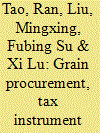

|
|
|
|
|
| Publication |
2011.
|
| Summary/Abstract |
In this paper, we argue that China's grain procurement system as a major instrument in rural taxation survived the communes and lost its importance only gradually in recent years. However, as agricultural liberalization progressed, the traditional tax instruments of 'tax deduction prior to grain procurement payment' and implicit taxation through 'price scissors' gradually eroded. Under such a circumstance, local governments in agriculture-based regions resorted to informal fees collected directly from individual rural households while the more industrialized regions shifted to non-agricultural taxes that are less costly in terms of tax collection. Empirical evidence based on a large panel data set supports our hypotheses of rural taxation in China.
|
|
|
|
|
|
|
|
|
|
|
|
|
|
|
|
| 8 |
ID:
103357
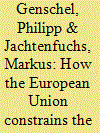

|
|
|
|
|
| Publication |
2011.
|
| Summary/Abstract |
This article challenges the common assumption that the European Union (EU) has little power over taxation. Based on a comprehensive analysis of EU tax legislation and European Court of Justice (ECJ) tax jurisprudence from 1958 to 2007, the article shows that the EU exerts considerable regulatory control over the Member States' taxing power and imposes tighter constraints on Member State taxes than the American federal government imposes on American state taxation. These findings contradict the standard account of the EU as a regulatory polity that specialises in apolitical issues of market creation and leaves control of highly politicised core functions of government (defence, taxation, social security, education, etc.) to the Member States; despite strong treaty safeguards, national tax autonomy is undermined by EU regulation.
|
|
|
|
|
|
|
|
|
|
|
|
|
|
|
|
| 9 |
ID:
090714


|
|
|
|
|
| Publication |
2009.
|
| Summary/Abstract |
This article discusses incoherence between tax and development policies, a relatively new area in the debate on policy coherence for development, using a case study of the Netherlands. Dutch business entities play a key role in tax avoidance structures of multinational corporations. We argue that the Dutch tax regime facilitates the avoidance of substantial amounts of tax revenues in developing countries when compared to the Dutch aid budget. As domestic tax revenues are an important source of financing for development, this suggests that the Dutch tax policy is incompatible with the Dutch policy on development co-operation. The lack of policy coherence is largely unintended but it has structural and political causes.
|
|
|
|
|
|
|
|
|
|
|
|
|
|
|
|
| 10 |
ID:
153004
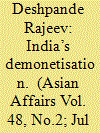

|
|
|
|
|
| Summary/Abstract |
This article offers an account of the impact of Indian PM Narendra Modi’s decision in November 2016 to withdraw suddenly all Rs 500 and Rs 1000 notes from circulation in India with the avowed intent of combatting fraud, tax avoidance and other economic problems. The article assesses the impact from the demonetisation in November to the March 2017 Indian regional elections, where wide-scale victories for Modi’s political party, the BJP, appear to have vindicated his reforms. The article provides an analysis of the political background of the period, as well as looking at the economic and societal impact of the changes, including the way in which the behaviour of Indian citizens has been ‘nudged’ with particular regard to use of banking, transactions, social effects, and payment of tax.
|
|
|
|
|
|
|
|
|
|
|
|
|
|
|
|
| 11 |
ID:
161499


|
|
|
|
|
| Summary/Abstract |
The intense and volatile relations between China and Vietnam in the dyadic world of the Cold War have drawn scholarly attention to the strategic concerns of Beijing and Hanoi. In this article I move the level of analysis down to the border space where the peoples of the two countries meet on a daily basis. I examine the tug-of-war between the states and smuggling networks on the Sino-Vietnamese border during the second half of the twentieth century and its implications for the present-day bilateral relationship. I highlight that the existence of the historically nonstate space was a security concern for modernizing states in Asia during and after the Cold War, which is an understudied aspect of China's relations with Vietnam and with its Asian neighbors more broadly. The border issue between China and its Asian neighbors concerned not only territorial disputes and demarcation but also the establishment of state authority in marginal societies.
|
|
|
|
|
|
|
|
|
|
|
|
|
|
|
|
| 12 |
ID:
187591


|
|
|
|
|
| Summary/Abstract |
In the present study, a novel approach for calculating optimal quota and tax regimes is investigated. A meta-heuristic framework has been developed to find the optimal quota regime for the national or worldwide aviation industry. The minimization of ticket prices and CO2 emissions are considered to be objective functions. The results of the current study indicate that implementing optimized quotas is more effective than intensive tax regimes. To elaborate, much more important than the value of the carbon price is the shape (convexity or concavity) of the tax regime. The optimal tax regime shape is also obtained. Based on the optimal quota and tax regime, the concept of golden time and value is introduced. In the golden time window, investing in Sustainable Aviation Fuels (SAFs) will be the most cost-effective. Furthermore, the results demonstrate that neither the sole introduction of quotas nor the imposition of high carbon taxes are beneficial from an economic and decarbonization standpoint. Thus, an optimized quota regime should be employed. These quotas should be introduced as soon as possible, and their implementation should be combined with political efforts to introduce a carbon tax and policies supporting the development of an alternative jet fuel industry.
|
|
|
|
|
|
|
|
|
|
|
|
|
|
|
|
| 13 |
ID:
115158


|
|
|
|
|
| Publication |
2012.
|
| Summary/Abstract |
Enhanced environmental quality, fuel security, and economic development, along with reduced prices of blended diesel, are often used as justifications for a U.S. federal excise tax exemption on biodiesel fuels. However, the possible effect of increased overall consumption of fuel in response to lower total prices, mitigating the environmental and fuel security benefits, are generally not considered. Taking this price response into account, the optimal U.S biodiesel subsidy is derived. Estimated values of the optimal subsidy are close to the recently expired subsidy, revealing the subsidy's environmental and security benefits. However, further positive environmental and security benefits from the biodiesel tax-exemption subsidy may be obtained if the subsidy is combined with a federal excise tax on petroleum diesel.
|
|
|
|
|
|
|
|
|
|
|
|
|
|
|
|
| 14 |
ID:
184106
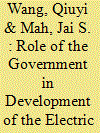

|
|
|
|
|
| Summary/Abstract |
As one of the technology-intensive industries, the electric vehicle (EV) industry has attracted the attention of the Chinese government. It has provided various incentives for the purchase of EVs, including tax incentives, policy loans at preferential interest rates and the establishment of charging facilities. EV production technology developed rapidly and sales of EVs increased significantly during the 2010s. The role of the government seems to have been of vital importance to the rapid development of the EV industry in China. To improve this further, it would be helpful for the government to efficiently coordinate various policy measures benefitting the EV industry and create a more suitable social environment for consumers to use EVs. The government should also carefully consider how to improve the applicability of EVs in different regional surroundings. In addition, efficient collaboration between the electronics industry and the automobile industry would be critical.
|
|
|
|
|
|
|
|
|
|
|
|
|
|
|
|
| 15 |
ID:
099472
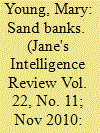

|
|
|
| 16 |
ID:
092375


|
|
|
|
|
| Publication |
2009.
|
| Summary/Abstract |
Upon becoming Conservative leader, David Cameron, and his Shadow Chancellor, George Osborne, initially sought to compete with Labour by pledging increased expenditure on education and the NHS, and thereby insisting that tax cuts would have to wait. Rather than cutting taxation overall, the emphasis was on restructuring and simplifying Britain's tax system, and shifting the burden towards the better off, mainly thorough promoting environmental taxes. However, the economic collapse at the end of 2008 has prompted the Conservatives to modify this new economic stance, by insisting that they will no longer match Labour's planned increases in public expenditure, but, instead, will increase it at a lower rate. This is intended to reduce the need to increase government borrowing during the recession, and thereby ensure that when the economy recovers, the proceeds of economic growth can be shared between higher public expenditure and lower taxation, rather than being spent on repaying government debt for many years ahead.
|
|
|
|
|
|
|
|
|
|
|
|
|
|
|
|
| 17 |
ID:
105115
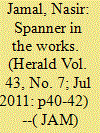

|
|
|
| 18 |
ID:
108960


|
|
|
|
|
| Publication |
2011.
|
| Summary/Abstract |
This article presents the normative case for global tax governance. Contrary to an influential part of the literature, national tax policy choices cause significant externalities for other nation-states. Focusing on business taxation, the article shows that tax competition undermines the integrity and distributive principles of domestic tax systems and aggravates the inequality between developed and developing countries. Further, it demonstrates that the effects of international tax competition are unjust irrespective of whether a globalist or less demanding internationalist perspective on justice is adopted. The minimum requirement of justice is to devise global rules that ensure that national tax systems remain capable of implementing distributive justice as they see fit. Finally, the article presents and discusses a concrete proposal for the global governance of business tax competition, namely, unitary taxation with formula apportionment.
|
|
|
|
|
|
|
|
|
|
|
|
|
|
|
|
| 19 |
ID:
186317


|
|
|
|
|
| Summary/Abstract |
Tax compliance is a major concern as states try to increase state revenues in order to provide services for their populations. Remarkably, taxation has not figured centrally on the agenda among scholars working on the African voter. This article contributes through studying the social practice of taxes, by asking: how is taxation understood as a political practice? This is studied using focus groups across the private and public sector in Namibia, where the willingness to pay taxes and the relative tax burden is high. This micro-study of citizens’ experiences focuses on the perceived room for political practice in relation to taxes, sense of influence over taxes and whether taxes are thought about in citizenship terms. The article shows that taxes are relegated to a sphere of politics where deliberation and opportunities for accountability are missing, yet ideas of duty are central elements of tax compliance.
|
|
|
|
|
|
|
|
|
|
|
|
|
|
|
|
| 20 |
ID:
100126
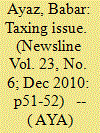

|
|
|
|
|
|
|
|